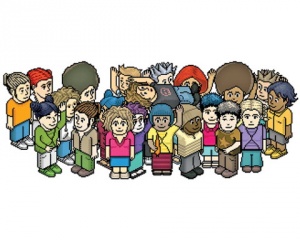Virtual Community
A virtual community is a social network of a group people that shares some common values and a group of interacting people through some form of a virtual avatar.
Contents
Introduction
A community is defined as "a unified body of individuals: as the people with common interests living in a particular area, and an interacting population of various kinds of individuals (as species) in a common location." according to Merriam-Webster dictionary. This definition of a community minus the notation about having a "common location" or "particular area" describes a virtual community. A virtual community is very much the same as a traditional community but instead of sharing a physical area, a virtual community can be linked through many different virtual avenues. Such avenues include Social Networks, Online Chat Rooms, Virtual Worlds, Online Gaming, etc.
Types of virtual communities
Online Gaming
Online gaming communities are popular and typically feature expansive online virtual communities. Interaction in online gaming environments takes place in virtual worlds and is limited by the design of the game's play mechanics. Various types of online game genres exist ranging from shooter to role-playing type games. Interaction inside of virtual worlds ranges by game type and design. Some games offer players more freedom to interact and form relationships with other players, while other games or more focused on completing objectives or winning a match. Players interact via an avatar which visually represents the user's character in the game. Avatars are given customization options that allow the player to portray themselves in-game as they see fit. There are often online forum communities that supplement in-game worlds, allowing players a further level of interaction with other players, developers and the game community as a whole.
MMORPGs
MMORPGs, short for Massively Multiplayer Online Role Playing Games, are one of the most popular current online game genres. MMORPGs feature large sprawling virtual worlds, large populations of players and varying types of play mechanics. Although varying by game, the basic game-play of most MMORPGs involves creating a character, leveling up that character by completing objectives or tasks inside the game world, following the game's story line and interacting with other players within the game environment. Most MMORPGs are in fact role-playing games, where users select a class that dictates their role type within groups of other players. An example of these role types are healers, tanks and damage dealers within the MMORPG World of Warcraft.
A list of current MMORPGs by popularity and playability. [1]
| MMORPGs |
|---|
| World of Warcraft |
| Rift |
| Eve Online |
| Guild Wars |
| Darkfall |
| Aion |
| Lord of the Rings Online |
| Maple Story |
| City of Heroes |
| Champions Online |
| Dark Age of Camalot |
Online Chat Rooms
A virtual community can also consist of being an online chat room. An online chat room can be describe as any form of synchronous conferencing. The term can mean any technology ranging from real-time online chatting over instant messaging and online forums.
Social Network Services
Arguably the most popular type of virtual communities, social networking sites provide a platform for users to connect with other members, who are oftentimes a part of their circles in real life. Facebook, MySpace, and Twitter are some examples of social networking services.
Online Forums
Online forums are a popular form of virtual community. Online forums, sometimes referred to as "boards", are websites or sections of websites that act as discussion areas where users interact with each other about designated topics. There are various types of forums with different mechanics, but most follow a similar design. Users are asked to register for a forum to allow participation. Users create a profile that typically includes basic information like name, location, interests, links to social networking profiles and an avatar photo. There are also anonymous forums like 4chan.org [2] that don't require users to create a profile to contribute.
Forums are typically focused around one broad topic such as gaming, art or music. There are also forums dedicated to a wide variety of niche topics like ghostnote.net [3], a niche community forum dedicated to percussive instrument construction. While forums are usually focused on one topic, there exists popular "everything" forums like reddit.com [4] that feature subsections for discussion on numerous different topics such as world news, politics or technology.
Forums vary by content type and presentation. Traditional online forums feature a general discussion section as well as subsections dedicated to different subtopics. The traditional forum format presents users with a list of "threads", or user contributed discussion prompts, and information about the threads creators, number of posts and the date/time created. Forums like reddit.com give users the option to create traditional discussion threads as well as links to other sites, images or videos along with a discussion area for the presented content.
Private Communities
While some sites are publicly accessible, other communities like to maintain a more privileged environment. Some are located on the dark-net while others are invite only. Some require interviews and other require you to solve riddles. Users like their utopian pockets of privilege. These communities encourage secrecy and elitism in their selection process. The environment can drastically alter once accepted. Some communities require their users to dedicated time and energy to maintaining their status, other provide a level, non-hierarchical playing field. More commonly, these private communities tend to foucs on rank within their circles as well. The most popular types of communities are ones that relate to a private torrent tracker.
What.cd
What.cd is the premier private BitTorrent tracker on the web. It was founded on the closure of Oink's Pink Palace in 2007 and has dominated the domain ever since. It exists completely on a voluntary donation basis and in December 2010, reached the 1 million torrent mark heretofore unsurpassed by any private tracker. Membership can only be gained through an invite or Inter-relay chat interview. Each individual is allowed only one account per life-time and the rules guarding the site's privacy and high "ratio" are extremely stringent. If a user makes even a single mistake, his membership is permanently terminated. What.cd has the normal required ratio that maintains that all users share, or "seed", a certain amount of their data.
Ethical Dillemmas
What.cd uses a slew of automatic programming processes to maintain, reward, and punish its users. The algorithms enforce selflessness in an ethical sense and discourage entropy in an organizational sense. The ethical boundaries the what.cd system algorithms enforce the organizational perfection of music indexing. Every upload must conform to an extremely rigorous standard that includes logging a perfect transcription process for audio conversion and even articulates the file name down to the right underscore. It enforces this standard through a process called “trumping”. If an upload does not fit the criteria perfectly, or the user, having a lossless quality song, does not transcribe the song into all sub-qualities as well, another user can trump his upload. Trumping gives all the credit and more importantly, bandwidth, to the trumper thereby removing the original uploader who most likely purchased the lossless quality content. This incentive system forces users to perfect their art of sharing.
Impacts of virtual communities
Ethical Impacts
The sense of anonymity found in virtual communities presents an ethical challenge due to the fact that it is easier for individuals to identify others who are at risk for identity theft or sexual predation. Many of these sites may deal with mature content and it is hard to identify users who are truly at the lawful age to view such content. For example, the popular media site Facebook has a required age of 13 to sign up for an account. There are very limited ways for administrators to ensure that users are of a certain age and a large number of adults have admitted to helping their child gain access to the site even though they are younger than 13 [5].
There is also a problem with inaccurate information being posted in virtual communities. Because a sense of trust is fostered more naturally amongst users of virtual communities due to their shared interests, unreliable and false information can be easily construed to be true.

